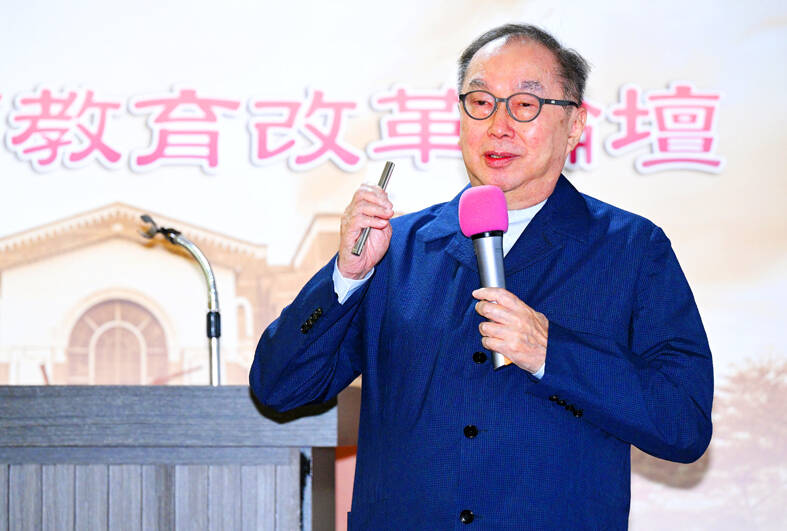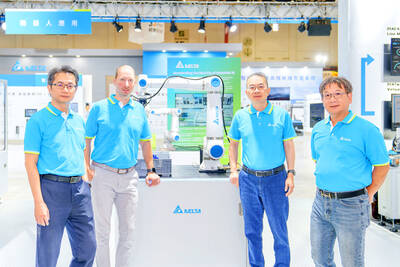Quanta Computer Inc (廣達) founder and chairman Barry Lam (林百里) has been named the richest person in Taiwan, thanks to the company’s role in the global supply chain of artificial intelligence (AI), US magazine Forbes said.
Shares of Quanta soared 37.15 percent this year to NT$293.50 on Wednesday, before the local bourse closed for the rest of the week for the Tomb Sweeping Day holiday, Taiwan Stock Exchange data showed.
Lam, 74, who steers a company that provides data centers, cloud systems and other electronics, has a net worth of US$12.6 billion and ranks 190th in the world. Quanta Computer is also a supplier to Tesla Inc and Apple Inc.

Photo: Liao Chen-hui, Taipei Times
Globally, Bernard Arnault, who oversees the LVMH Moet Hennessy Louis Vuitton SE empire of 75 fashion and cosmetics brands, retained the title of the world’s richest person, followed by Amazon.com Inc founder Jeff Bezos and Tesla Inc chief executive Elon Musk.
“The fortunes of the world’s billionaires continue to swell in 2024 as global stock markets shrug off war, political unrest and lingering inflation,” Forbes said.
They are richer than ever, worth US$14.2 trillion in aggregate, up by US$2 trillion from last year and US$1.1 trillion above the previous record set in 2021, it said.
Nvidia Corp cofounder Jensen Huang (黃仁勳) rose to become the 20th richest person as the net worth of world’s dominant supplier of AI hardware and software expanded nearly threefold last year.
Meta Platforms Inc chief executive Mark Zuckerberg ranked as the fourth-most wealthy person following a spike in the company’s net worth last year, Forbes said.
There are now more billionaires than ever, 2,781 in all, 141 more than last year and 26 more than the record also set in 2021, it said.
After Lam, footwear tycoon Zhang Cong-yuan (張聰淵), founder of shoe manufacturer Huali Industrial Group (華利實業集團), took the second spot in Taiwan and was ranked 295th in the world with a net worth of US$8.6 billion.
Hon Hai Precision Industry Co (鴻海) founder Terry Gou (郭台銘) had a net worth of US$7.5B billion, placing third in Taiwan and 354th globally, it said.
Two-thirds of the list’s members are worth more than a year earlier and only one-fourth are poorer, Forbes said.
Much of the gains come from the top 20, who added a combined US$700 billion in wealth since last year, it said.
The US now boasts a record-high of 813 billionaires worth a combined US$5.7 trillion, Forbes said, adding that China (including Hong Kong) remained second with 473 billionaires worth US$1.7 trillion, despite weak consumer spending and a real-estate bust that helped wipe out some US$300 billion in wealth.

SETBACK: Apple’s India iPhone push has been disrupted after Foxconn recalled hundreds of Chinese engineers, amid Beijing’s attempts to curb tech transfers Apple Inc assembly partner Hon Hai Precision Industry Co (鴻海精密), also known internationally as Foxconn Technology Group (富士康科技集團), has recalled about 300 Chinese engineers from a factory in India, the latest setback for the iPhone maker’s push to rapidly expand in the country. The extraction of Chinese workers from the factory of Yuzhan Technology (India) Private Ltd, a Hon Hai component unit, in southern Tamil Nadu state, is the second such move in a few months. The company has started flying in Taiwanese engineers to replace staff leaving, people familiar with the matter said, asking not to be named, as the

The prices of gasoline and diesel at domestic fuel stations are to rise NT$0.1 and NT$0.4 per liter this week respectively, after international crude oil prices rose last week, CPC Corp, Taiwan (台灣中油) and Formosa Petrochemical Corp (台塑石化) announced yesterday. Effective today, gasoline prices at CPC and Formosa stations are to rise to NT$27.3, NT$28.8 and NT$30.8 per liter for 92, 95 and 98-octane unleaded gasoline respectively, the companies said in separate statements. The price of premium diesel is to rise to NT$26.2 per liter at CPC stations and NT$26 at Formosa pumps, they said. The announcements came after international crude oil prices

STABLE DEMAND: Delta supplies US clients in the aerospace, defense and machinery segments, and expects second-half sales to be similar to the first half Delta Electronics Inc (台達電) expects its US automation business to remain steady in the second half, with no signs of weakening client demand. With demand from US clients remaining solid, its performance in the second half is expected to be similar to that of the first half, Andy Liu (劉佳容), general manager of the company’s industrial automation business group, said on the sidelines of the Taiwan Automation Intelligence and Robot Show in Taipei on Wednesday. The company earlier reported that revenue from its automation business grew 7 percent year-on-year to NT$27.22 billion (US$889.98 million) in the first half, accounting for 11 percent

A German company is putting used electric vehicle batteries to new use by stacking them into fridge-size units that homes and businesses can use to store their excess solar and wind energy. This week, the company Voltfang — which means “catching volts” — opened its first industrial site in Aachen, Germany, near the Belgian and Dutch borders. With about 100 staff, Voltfang says it is the biggest facility of its kind in Europe in the budding sector of refurbishing lithium-ion batteries. Its CEO David Oudsandji hopes it would help Europe’s biggest economy ween itself off fossil fuels and increasingly rely on climate-friendly renewables. While